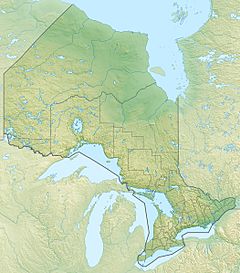Fox River (Thunder Bay District) facts for kids
Quick facts for kids Fox River |
|
|---|---|
|
Location of the mouth of the Fox River in Ontario
|
|
| Country | Canada |
| Province | Ontario |
| Region | Northwestern Ontario |
| District | Thunder Bay |
| Physical characteristics | |
| Main source | Unnamed lake 506 m (1,660 ft) 48°20′37″N 85°27′53″W / 48.34361°N 85.46472°W |
| River mouth | Pukaskwa River 378 m (1,240 ft) 48°13′55″N 85°37′06″W / 48.23194°N 85.61833°W |
| Basin features | |
| River system | Great Lakes Basin |
The Fox River is a small river located in Thunder Bay District in Northwestern Ontario, Canada. It is an important part of the Great Lakes Basin, which is a huge area of land where all the water eventually flows into the Great Lakes. The Fox River is a "right tributary" of the Pukaskwa River, meaning it flows into the Pukaskwa River from the right side. This meeting point is inside the beautiful Pukaskwa National Park.
Journey of the Fox River
The Fox River starts its journey in an unnamed lake. This lake is its "source," or where the river begins. From there, the river flows towards the southwest.
Through Lakes and Parks
As it travels, the Fox River flows into two other lakes. First, it enters Partridge Lake. After leaving Partridge Lake, it continues its path into Fox Lake.
The river keeps moving southwest. Eventually, it flows into Pukaskwa National Park. This park is a protected area known for its wild nature. The Fox River ends its journey when it reaches its "mouth" at the Pukaskwa River. The Pukaskwa River then flows into Lake Superior, one of the Great Lakes.
The Great Lakes Basin Connection
The Fox River is part of a much larger system called the Great Lakes Basin. This basin includes all the rivers, streams, and lakes that drain into the Great Lakes. Water from the Fox River eventually makes its way into Lake Superior. From there, it travels through the other Great Lakes. Finally, it flows out to the Atlantic Ocean through the Saint Lawrence River.
This connection means that the Fox River, even though it's small, plays a part in a huge freshwater system. It helps to keep the Great Lakes filled with water.


